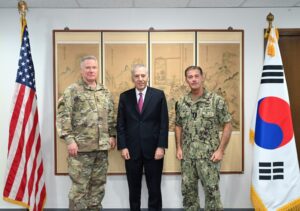China and North Korea over the years have deepened their relations through means of diplomatic and defense cooperation. Ideologically identical, their masterful association for a polarized-world evoke international eyeballs.
Zhao Leji, chairman of China’s National People’s Congress Standing Committee, held talks with Choe Ryong Hae, Chairman of the Standing Committee of the Supreme People’s Assembly of the Democratic People’s Republic of Korea (DPRK) in Pyongyang on Thursday.
The bilateral conference was held to muster dialogue on global uncertainties powered by war and economic-turbulation. This visit by a third-highest Chinese diplomat to Pyongyang was a second in line after 2019. The intention to strengthen ties comes at a time when bulk of Asian nations are elevating diplomatic and defense relations with United States.
Amid growing fear of Western hegemony, Pyongyang has seek to strengthen coordination with both Beijing and Moscow.

Zhao Leji, China’s third-highest ranked official, “will lead a delegation for a good-will visit to Pyongyang to kickstart a friendship year marking 75 years of diplomatic ties”, Beijing announced Tuesday.
Zhao leads China’s national legislature and is a member of its powerful seven-man Politburo Standing Committee. His presence in Pyongyang is certainly a huge vouch for the trust the Chinese Communist Party has in the extremely secretive North Korean administration and their 75 years of growing effort to cooperate on various political, economic and defense related issues.
China and North Korea’s ‘goodwill’ exchange in view of growing polarization
A relation cemented against world-alliances lead by United States is a strategy which is intensifying the already polarized world. The trip comes as both countries fear the growing security coordination between United States, Japan and South Korea, which in turn seek to counter aggression from Beijing and Pyongyang.
The consistent threat imposed by China to sabotage territorial sovereignty of its neighbors has alarmed United States to gear-up and solidify its relations with countries engaged in or are preparing for retaliation against China’s uncalled invasions.

U.S Commander Adm. John C. Aquilino traveled to South Korea on April 10-11, to underscore the U.S’s commitment towards wheeling peace and security in Indo-Pacific region.
In view of global concerns and changing dynamics, Pyongyang has also asserted strong relations with Moscow – begun supplying arms used in war against Ukraine in violations of the sanctions imposed on Pyongyang by U.N.S.C, alleges United States.
United States Treasury Secretary, Janet Yellen had visited Beijing a couple of days ago to reinforce the dismantling relationship between the two countries through dialogue and forge a pact of ‘mutual-understanding’. But the ruthless commitment of China to ravage even a tiny speck of opportunity to unleash its force against its neighbors has laddered U.S to mount alliance with Indo-pacific nations.
U.S President Joe Biden in another effort to empower Indo-Pacific alliance, hosted a trilateral summit with the Philippines and Japan on Thursday, a day later when President Biden held a bilateral meet with Japanese Prime Minister Fumio Kishida to advance coordination around countering challenges from Beijing and Pyongyang.
China – An economic lifeline for North Korea?
China is a growing economic lifeline for Pyongyang crippled by a flurry of international sanctions against its nuclear testing and arms-display. Sharing a history of ideological sentiments, they fought together in the Korean war of 1950s.
Beijing stands to also benefit from Pyongyang’s provocative rhetoric and weapon testing which can push United States to shift its lens of focus from the former to the latter, helping China to readjust its souring relations with the West.

China who has played close attention to growing international relations between North Korea and Russia, where Kim made a visit last year to meet Russian President Vladimir Putin has only attempted to expand economic, military and diplomatic ties with Russia following Ukraine’s invasion.
The three authoritarian countries since the war has ruptured fabrics of economic certainties have consolidated a deep and meaningful tie to oppose the American network of alliances and form a strong defense statehood. The future this trilogy hold is unknown, what is certain is China’s visit to North Korea draws international eyeballs.













Comments 1